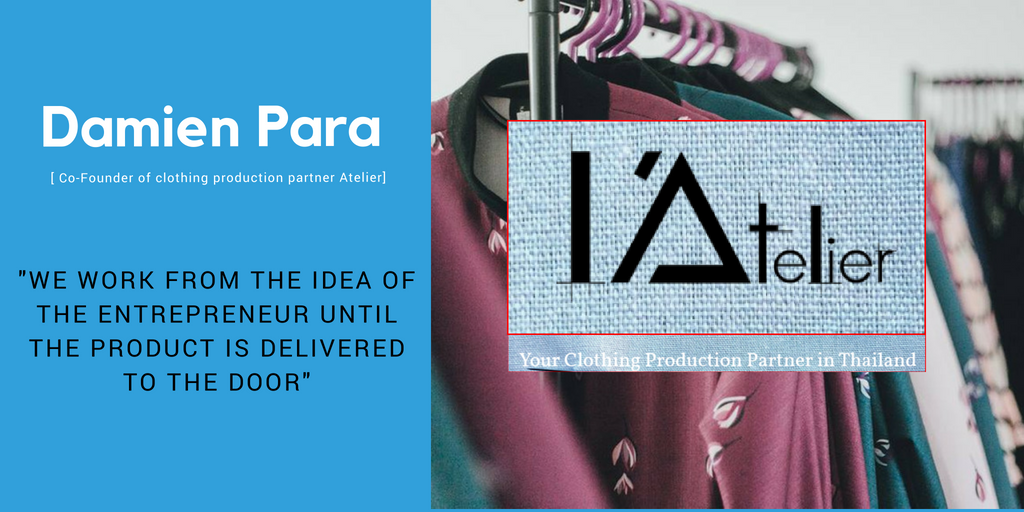Interview with Damien Para Co-Founder of clothing manufacturer Atelier
The clothing manufacturing company Atelier Chiang Mai is an innovative workshop that allows anyone the opportunity to produce any type of garment you can imagine.
Recently in my travels to Chiang Mai, Thailand I got the opportunity to meet with and interview the Co-Founder and manager of Atelier Damien Para.
Damien is a French business manager. After studying in several business schools around the world (EBS Paris, EBS Madrid, Shaghai University, Pace University) he worked as a Business Manager in Belgium.
Now as the manager of the Atelier Damien is using his skills to solve the problems start up brands have to compete in the Fashion Industry.
Here is the interview:
What is the name of your business? Where are you located? What are you trying to accomplish with your venture?
The Atelier is a high-end clothing manufacturer based in Chiang Mai Thailand, dedicated to designer and premium garment manufacturing. We offer a fully integrated service to fashion designers, established brands or startups. Our goal is to facilitate the complicated part of creating a clothing collection in Asia.
Indeed, between fabric sourcing, technical pack, importation tax, shipment, quality control, or manufacturing, most of the designers of emerging brands as well as established brand don’t have lot of time left for design research and development.
What is your background and how long have you been involved with this industry?
Nathalie Fordeyn, my partner, studied Fashion Design at the Royal Academy of Fine Arts of Antwerp. Afterwards, she worked several years as fashion designer for several fashion brands such as Galliano Paris, Diane Von Furstenberg New York and Sonya Rykiel Paris.
I personally studied finance in renown business school in Paris and worked several years as a project manager in the fashion industry sector.
In 2013, we created a high and but still affordable fashion brand in Paris, France. With luxurious quality and finishing, we had to find a way to manufacture the garments at the right price with a professional and quality oriented manufacturer. Indeed, with our most expensive coats ranging from 600 USD to 800 USD, we were unable to produce in Europe.
As Nathalie is half Thai and half Belgian, we started to work with manufacturers in Thailand in 2014.
How did your idea come about? How did you organize your team?
We soon realized that the prices were ridiculous for small order quantities. Furthermore, the quality was honestly very disappointing, and we lost several clients because of a total lack of professionalism of the local clothing manufacturer in Thailand.
We then decided that the best way to move forward was to create our own manufacturing team. Between 2015 and 2016, we created a small Atelier of 5 people, entirely dedicated to the production of our Brand in Thailand.
By the end of 2016, several brands asked us if we could also take care of their production, which we did. Our team has been growing steadily since then.
We are now 30 people in the company and everyone works based on European manufacturing and quality standards. We work from the idea of the entrepreneur until the product delivery to his door.
We now have a pattern maker team, cutters and two teams of sewers specialized in stretch and woven fabrics.

While most manufacturers just cut and sew, we had to create a much more complex and intricate creative and manufacturing process that makes it easy for the designer.
We make it very easy for a startup brand to go through the process to partner with us to produce a product on our website, www.chiang-mai-clothing.com.
What were some of your concerns as a new business?
First of all, the main problem was to find skilled people capable and driven enough to work under our manufacturing process and quality standard. It is not easy to change ones mind and ways to work when he has 30 years of experience behind.
But after 3 years, I can say that we did manage to create a strong and steadily growing team.
We are planning on opening a school for disadvantaged children, potentially orphans or with violent parents from difficult areas of Thailand and maybe Laos in order to teach them how to read, write and to help them learn a work and get a life of their own.
Our second main concern was the minimum salary in Thailand that is higher than in many other surrounding countries. We just were not sure about the competition, but here again, the infrastructure, the craftsmanship skills and the education of our team but also the fabric availability in Thailand gave us a clear advantage.
This advantage is even more significant in high end clothing production.
As a small business operator, what type of lessons could you give to inventors and people with new ideas as to how to bring their ideas to fruition?
I would say that innovation and entrepreneurship in general is testing, trying, making mistake and learning from it to move forward and get better.
It means constantly reinventing yourself and your ideas. You should definitely start with a first prototype, testing it around you, show it to friends and family, take the critics, balance it out in order to either make a second prototype or to move on to production.
I always advise to start with a smaller production to take the test to the next step without putting all your assets in it. After this first batch production test, you get a clear idea of what works and what doesn’t.
You might have earned money or lost money but it doesn’t matter at this point. You know what you did wrong and how to correct it.
Then you, are ready to move on with the serious game.
Are you familiar with any of the laws regarding patent, trademark law or licensing and how they affect your business?
In general, every brand should have at least their name and logo carefully protected. We work with two brands that produce garments with innovative specificity. One in France, the other in the USA. Both registered the trademark for their innovation.
I believe that it is crucial and necessary as you might get your idea stolen easily and produced by tens of thousand by someone with a larger distributor network than you. You would then have lost everything that you worked for.
From our clothing manufacturing side, we usually sign a Non Disclosure Agreement with the brands in general. Innovators in the clothing industry should always sign a NDA with their manufacturer. There is absolutely no reason why a garment factory should refuse to sign one.
Do want to add anything else about yourself or your business?
I believe that I should add that I have seen many designers that were not aware of basic but extremely important legal matters in the clothing industry such as name and logo protection through registration of trademark or patented innovation.
I have already seen some brands facing serious problems with fake clothes with their brand names or garments with their innovations. I can only advise designers to discuss with a lawyer and to work with a professional and trustworthy manufacturer.







